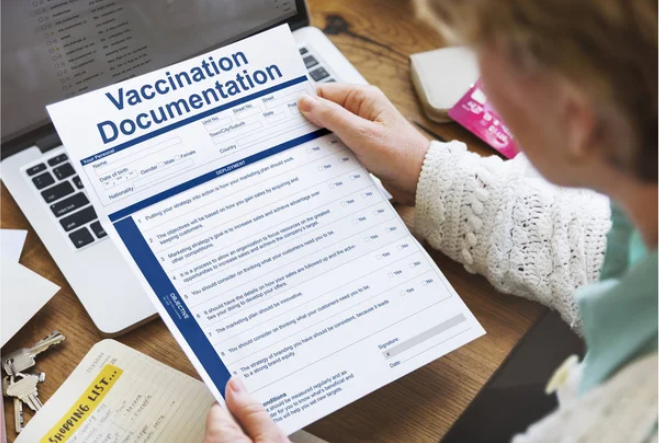Vaccination Records: Why They Matter and How to Keep Them Updated
Getting vaccinations on time is very important for our health and our family’s health. Vaccines help stop many sicknesses and save lives. But it can be hard to remember when to get them.
Entirely Kids Pediatrics helps families keep track of their shots. We can help you manage your child’s vaccine records. This keeps your family safe from diseases that vaccines can prevent. Talking to a Frisco pediatrician can also help you stay on top of your child’s shots.
Learn why vaccine records matter and how to manage them well. We’ll teach you how to find your child’s shot records online. We’ll also give you tips to keep shot records organized. Keeping track of your family’s vaccine history with help from a Frisco pediatrician has many benefits.
What Are Vaccination Records and Why Do They Matter?
Before we explore how to obtain and manage vaccination records, let’s first understand what they are and why they’re so important.
Defining Vaccination Records
A vaccination record, also known as an immunization record or shot record, is an official document that keeps track of all the vaccines an individual has received. It typically includes information such as:
- The type of vaccine administered
- The date of each dose
- The healthcare provider or clinic where the vaccine was given
- Any relevant batch numbers or manufacturer details
These records can be maintained in various formats, including paper documents, digital files, or entries in immunization information systems (IIS).
The Importance of Accurate Vaccination Records
Maintaining accurate and up-to-date vaccination records is essential for several reasons:
- Ensuring Proper Immunization: Vaccination records help healthcare providers determine which vaccines an individual has already received and which ones they may still need based on recommended schedules. This prevents unnecessary duplications or missed doses.
- School and Daycare Requirements: Most schools and daycare facilities require proof of certain vaccinations before enrollment. Having readily available records makes this process smoother.
- Travel Prerequisites: Some countries have specific vaccination requirements or recommendations for entry. Vaccination records can help you plan accordingly and provide necessary documentation.
- Personal Health Management: Keeping track of your own and your family’s vaccination history empowers you to take an active role in preventive healthcare.
- Public Health Initiatives: Accurate vaccination records contribute to larger public health efforts, such as monitoring vaccination coverage, identifying at-risk populations, and responding to outbreaks.
Now that we understand the significance of vaccination records let’s explore how to obtain and maintain them effectively.
How to Get Your Child’s Immunization Records Online

In the digital age, accessing your child’s immunization records has become more convenient than ever. Many states and healthcare providers now offer online portals or databases where you can view, download, or print your child’s immunization record. Here’s a step-by-step guide on how to get your child’s immunization records online:
Step 1: Check with Your State’s Immunization Information System (IIS)
Most states have an IIS, which is a confidential, computerized database that records all vaccine doses administered by participating providers. To find out if your state has an IIS and how to access it:
- Visit the CDC’s IIS website and click on your state.
- Follow the provided instructions for accessing your state’s IIS.
- You may need to register for an account or provide identifying information to verify your identity.
Step 2: Contact Your Child’s Healthcare Provider
If your child’s immunization records are not available through your state’s IIS, or if you need additional assistance, reach out to your child’s pediatrician or primary care provider. Many healthcare offices now use patient portals, where you can securely access your child’s medical records online.
- Log in to your provider’s patient portal using your registered username and password.
- Navigate to the immunization or medical records section.
- View, download, or print your child’s shot records as needed.
If your provider doesn’t offer a patient portal, you can still request your child’s immunization record by phone, email, or in person.
Step 3: Check with Your Child’s School or Daycare
In some cases, schools or daycare facilities may have copies of your child’s immunization records on file. While this should not be your primary source, it can serve as a backup if needed.
- Contact your child’s school or daycare administrator and request a copy of their immunization records.
- Verify that the information matches your own records or those obtained from your state’s IIS or healthcare provider.
By leveraging these digital tools and resources, you can easily access and manage your child’s immunization records online, saving time and ensuring you always have the most up-to-date information at your fingertips.
ImmTrac: The Texas Immunization Registry
Tracking vaccination records can be a daunting task for many parents. Fortunately, Texas offers a solution to this challenge through ImmTrac, the Texas Immunization Registry. ImmTrac is a free service provided by the Texas Department of State Health Services that securely stores vaccine records for Texas residents.
Benefits of ImmTrac
- Convenience: ImmTrac consolidates vaccination records from various healthcare providers into one secure, easily accessible system.
- Peace of Mind: Parents no longer need to worry about misplacing paper records or scrambling to find them during school enrollment or medical emergencies.
- Accessibility: Authorized healthcare providers and schools can access immunization records quickly, ensuring that your child receives the necessary vaccines on time.
How to Enroll in ImmTrac
Enrollment in ImmTrac is voluntary and can be done at the time of birth or later. Here’s how you can enroll your child:
- At Birth: Most hospitals and birthing centers offer ImmTrac registration for newborns. You will be given a consent form to sign, allowing your child’s immunization records to be stored in the registry.
- Later Enrollment: If your child was not enrolled at birth, you can still register them by completing a consent form available from your healthcare provider or the Texas Department of State Health Services website.
Accessing ImmTrac Records
To access your child’s immunization records stored in ImmTrac, you can:
- Contact Your Healthcare Provider: Authorized providers can retrieve and print your child’s records during a visit.
- Request Records Directly: You can request a copy of your child’s immunization history by contacting the Texas Department of State Health Services.
By utilizing ImmTrac, you can ensure that your child’s vaccination records are up-to-date and readily available, reducing stress and promoting better health management.
Benefits of Organized Child Immunization Records

As a parent, keeping organized child immunization records and shot records for kids offers numerous benefits beyond just meeting school requirements. Here are some key advantages:
1. Staying on Track with Recommended Schedules
The CDC provides recommended immunization schedules for children from birth through age 18. By maintaining organized records, you can easily reference these schedules and ensure your child receives all necessary vaccines at the appropriate times. This helps maximize their protection against vaccine-preventable diseases.
2. Identifying Missed or Delayed Vaccines
Life can get hectic, and it’s not uncommon for parents to occasionally miss or delay a child’s vaccination. With organized records, you can quickly identify any gaps and work with your healthcare provider to catch up on missed doses. This is especially important for series vaccines that require multiple doses over time.
3. Facilitating Communication with Healthcare Providers
When you have your child’s complete immunization history at your fingertips, you can more easily communicate with healthcare providers about their vaccination needs. This is particularly helpful if you move, switch providers, or seek care from specialists who may not have access to your child’s primary care records.
4. Simplifying School and Daycare Enrollment
As mentioned earlier, most schools and daycare facilities require proof of immunization for enrollment. By keeping organized records, you can streamline this process and avoid last-minute scrambles to track down missing information. Many schools now accept digital records or copies, making it even easier to provide documentation.
5. Empowering Informed Decision-Making
Organized vaccination records can help you make informed decisions about your child’s health. For example, if there’s a disease outbreak in your community, you can quickly reference your child’s records to determine if they’re protected or if they need additional vaccines. Similarly, if your child experiences an adverse reaction to a vaccine, having a record of the specific type and dose can help guide future vaccination decisions.
6. Serving as a Backup in Case of Emergency
In the unlikely event that your child’s medical records are lost, damaged, or inaccessible, having your own organized copy of their immunization history can serve as a valuable backup. This can help ensure continuity of care and prevent unnecessary revaccination.
7. Encouraging a Proactive Approach to Health
By actively maintaining your child’s immunization records, you’re modeling a proactive approach to health that can have lasting benefits. As your child grows, they’ll be more likely to appreciate the importance of preventive care and take ownership of their own health records.
So, while it may seem like just another item on the parental to-do list, keeping organized child immunization records and shot records for kids is a simple yet powerful way to promote your child’s lifelong health and well-being.
Tracking Vaccinations During Pregnancy

Vaccinations play a vital role not only in protecting the health of the pregnant individual but also in providing passive immunity to the developing fetus and newborn. As such, keeping track of vaccinations during pregnancy is an essential part of prenatal care.
Here are some key considerations:
Recommended Vaccines During Pregnancy
The CDC recommends two primary vaccines during pregnancy:
- Influenza (Flu) Vaccine: Pregnant individuals should receive a flu shot during any trimester of each pregnancy, as flu can cause severe illness and complications for both the mother and the developing fetus.
- Tetanus, Diphtheria, and Acellular Pertussis (Tdap) Vaccine: Tdap should be administered during the early part of the third trimester of each pregnancy (ideally between 27-36 weeks). This timing helps maximize the transfer of protective antibodies to the fetus.
Other vaccines, such as those for hepatitis A, hepatitis B, or pneumococcal disease, may be recommended based on individual risk factors and health status. Consult your doctor to determine which vaccines are appropriate for you during pregnancy.
Documenting Pregnancy Vaccinations
When you receive vaccinations during pregnancy, make sure to:
- Obtain a record of the vaccine type, date, and lot number from your healthcare provider.
- Add this information to your personal vaccination record, whether it’s a physical document, digital file, or app.
- Share the updated record with your prenatal care provider and any other relevant healthcare professionals.
- Bring a copy of your vaccination record to the hospital or birthing center when you go into labor, as this information may be needed for your newborn’s medical records.
Postpartum Vaccination Considerations
After giving birth, it’s important to review your vaccination status with your healthcare provider. Some vaccines, such as MMR (measles, mumps, rubella) and varicella (chickenpox), are not recommended during pregnancy but can be administered postpartum if needed. Additionally, if you did not receive the Tdap vaccine during pregnancy, you should get it immediately postpartum to help protect your newborn from pertussis (whooping cough).
Remember, maintaining accurate vaccination records during pregnancy and beyond is a crucial part of ensuring the health and well-being of both you and your growing family.
The Role of Schools in Promoting Vaccination and Maintaining Records

Schools play a critical role in promoting vaccination and maintaining accurate immunization records for their student populations. By requiring proof of immunization for enrollment and attendance, schools help create a safe and healthy learning environment while also contributing to broader public health goals.
Let’s explore this further:
School Immunization Requirements
Texas has specific laws requiring certain vaccinations for students entering public and private schools, as well as daycare centers. While these requirements are designed to protect public health, it’s essential for parents to ensure their children are up-to-date with their immunizations. The most commonly required vaccines include:
- Diphtheria, tetanus, and pertussis (DTaP)
- Measles, mumps, and rubella (MMR)
- Polio (IPV)
- Varicella (chickenpox)
- Hepatitis B
Some states may also require vaccinations against haemophilus influenzae type B (Hib), pneumococcal disease, hepatitis A, or meningococcal disease, depending on the age group and educational setting.
Additionally, some states may require unvaccinated students to complete additional steps, such as submitting annual exemption forms or attending vaccine education sessions. Ensuring primary care for children includes staying informed about these policies and requirements to keep your child’s health and education on track.
Conclusion
Maintaining accurate, up-to-date vaccination records is a critical component of personal and public health. By understanding the importance of these records, obtaining and organizing them, and staying informed about the childhood immunization schedule and recommended immunizations, individuals and families can play an active role in protecting themselves and their communities from vaccine-preventable diseases.
Accurate vaccination records ensure timely immunizations, help avoid missed or duplicate doses, and provide necessary documentation for schools and travel. For expert advice and assistance in managing your child’s immunization records, reach out to Entirely Kids Pediatrics. Contact us at 469-425-3600 to ensure your family stays protected and informed.
Frequently Asked Questions: Vaccination Records
-
Why are vaccination records important?
Vaccination records are crucial for tracking which vaccines you or your child have received. They ensure you don’t miss important shots or get unnecessary duplicates. These records are often required for school enrollment, travel, or certain jobs. They also allow healthcare providers to give appropriate care based on your immunization history.
-
How can I access my child’s immunization records online?
To access your child’s immunization records online, check with your state’s health department website for an immunization information system. You can also log in to your healthcare provider’s patient portal. If you’re unsure, contact your pediatrician’s office for guidance on accessing digital records.
-
What should I do if I’ve lost my vaccination records?
If you’ve lost your vaccination records, start by contacting your current and previous doctors’ offices. Check with your state’s health department and look through old school or employment records. You might need blood tests to check for immunity to certain diseases. Consult with a Frisco pediatrician about which vaccines may need to be readministered.
-
How often should I update my family’s vaccination records?
Update your family’s vaccination records after every new vaccination and at least once a year. It’s also important to update them before starting at a new school or daycare, prior to international travel, and when changing healthcare providers.
-
Can a Frisco pediatrician help me manage my child’s immunization schedule?
Yes, a Frisco pediatrician can help by providing personalized immunization schedules and answering questions about vaccine safety and efficacy. They keep accurate, up-to-date records of your child’s vaccinations and can send reminders for upcoming shots. They also offer guidance on catch-up schedules if any vaccines were missed.

